Most forest-dwelling species have been disrupted by fragmentation, new research suggests. Using a new analysis method, scientists assessed the impact of human-induced forest fragmentation on the abundance of 1,673 species of mammals, birds, reptiles and amphibians around the globe. Their findings revealed that in many forests, the animal communities in the core differ greatly from […]
Tag: conservation
Eliminating tax on private land could help meet Canadian conservation targets 
Shifting property tax from private land with high conservation value to regions with lower conservation value could help the Canadian government meet its conservation targets – without taking a hit to tax revenue. A new study paper explores the concept of such “tax-shifting” as a way to maximize the efficiency of conservation investments in highly […]
8 ways to safeguard scientific integrity in policy-making 
In order for government bodies to make informed, science-based decisions, open and honest communication has to exist – both among the scientists consulting key decision-makers, and in the government scientists’ communication to the public and media. A new paper outlines how such scientific integrity is currently under threat in Canada, Australia and the US, and how these […]
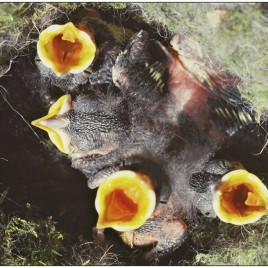
Which chick to feed? How birds choose
Which chick gets fed first in a brood seems to depend more on the environment than a chick’s begging or its size. That’s what researchers report after reviewing data on 143 different bird species. When food is plentiful and supplies are stable, birds will usually feed the chicks who beg the most and are […]
Recovery is possible for global fisheries
The world’s declining fisheries could recover in less than a decade if management reforms are implemented in time, according to researchers. Researchers looked at 4,500 fisheries in the world, representing about 78 per cent of the reported global catch using state of the art bio-economic models. The researchers found that while the majority of fisheries […]
Recipe for a waste-free world
A series of comment pieces discuss the circular economy – where industrial outputs become inputs so that goods at the end of their life turn into resources for other uses. In the first article Walter Stahel, who coined the concept of the circular economy, argues it is time to shift to a “resource-miser” economy. He […]
Conservations silver bullet
Removing invasive mammals has major benefits to an island ecosystem, according to a new study. As this type of conservation effort is expensive, researchers set out to understand the impact of this strategy. The benefits they saw “highlight the importance of this conservation measure for protecting the world’s most threatened species.” Original research paper published in the Proceedings of […]
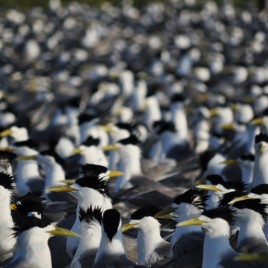
A bird’s eye view of birds
The view seen by humans (left) and drones (right) when trying to count seabird populations from either the ground or the air. (Image credits: Jarrod Hodgson) A new study compares the accuracy of monitoring of sea bird colonies by UAVs and traditional human ground counts and demonstrates that population estimates can be improved with this […]
How much warming has China caused?
As China has become increasingly industrialized over the past few decades its fossil fuel use has grown, along with its greenhouse gas emissions, and particulate air pollutants. Yet new research shows that its contribution to global warming has remained remarkably stable. Authors of this study show that China is responsible for about ten per cent […]
Changing grasslands in North America
The productivity of grasslands in North America will increase in future climate scenarios, despite higher temperatures and increased drought, say researchers. They developed this forecast using a new model of the region’s hydrology and vegetation, incorporating data and images gathered from a network of cameras. The model showed an earlier start to the growing […]
Cutting away at the mystery of leafcutting bees
Leafcutting bees use pieces of various plant leaves to build their nests, however determining which plants they prefer has been a challenge. In the past, researchers had to either observe leafcutting bees visiting a plant or identify pieces of leaf in the nest in to know which plant the bees relied on. Now, using DNA […]
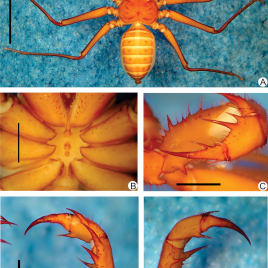
Newly discovered and already at risk
Eight new species of the Whip spider have been found in the Brazilian amazon, underscoring how little is known about biodiversity in this rainforest. However half of the newly discovered species’ habitat is threatened by human activity from dams and mining. Original research paper published in PLOS ONE on February 17, 2015. Names and affiliations of selected authors […]
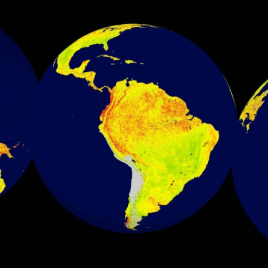
Mapping ecological sensitivity around the world
The areas of the world most sensitive to climate variation have been mapped by researchers. Using 14 years of satellite data researchers were able to develop the vegetation sensitivity index. The index is based on three variables that drive vegetation production – air temperature, water availability, and the degree of cloud cover. The researchers believe […]
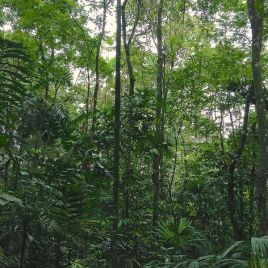
The resilience of tropical forests
Tropical rainforests that regrow after deforestation take up carbon more quickly than established forests and recover most of their biomass within decades, according to research on forests in Central and South America. Until now the recovery rate of these forests was unknown, hindering reliable estimates of their ability to absorb and store atmospheric carbon. […]
The secret to impacting policy
Environmental researchers can increase their influence on policy by increasing their outreach, according to researchers. Consulting with greater numbers of stakeholders during the research process increases how legitimate researchers are seen, regardless of how knowledgeable they are perceived as. Lead author Stephen Posner of the University of Vermont said “our results suggest that decision-makers are […]
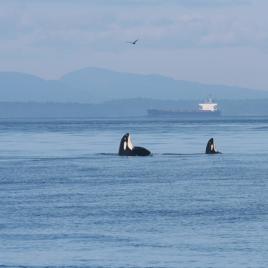
Shipping noises potentially harming Vancouver Island’s Killer Whales
New findings suggest noise from ships overlaps frequencies used for communication and foraging by orcas, potentially affecting the endangered Southern Resident orcas living in the waters around Vancouver Island, B.C. The researchers found container ships created the highest levels of background noise at frequencies below 20,000 Hz, and military vessels typically had some of the […]
